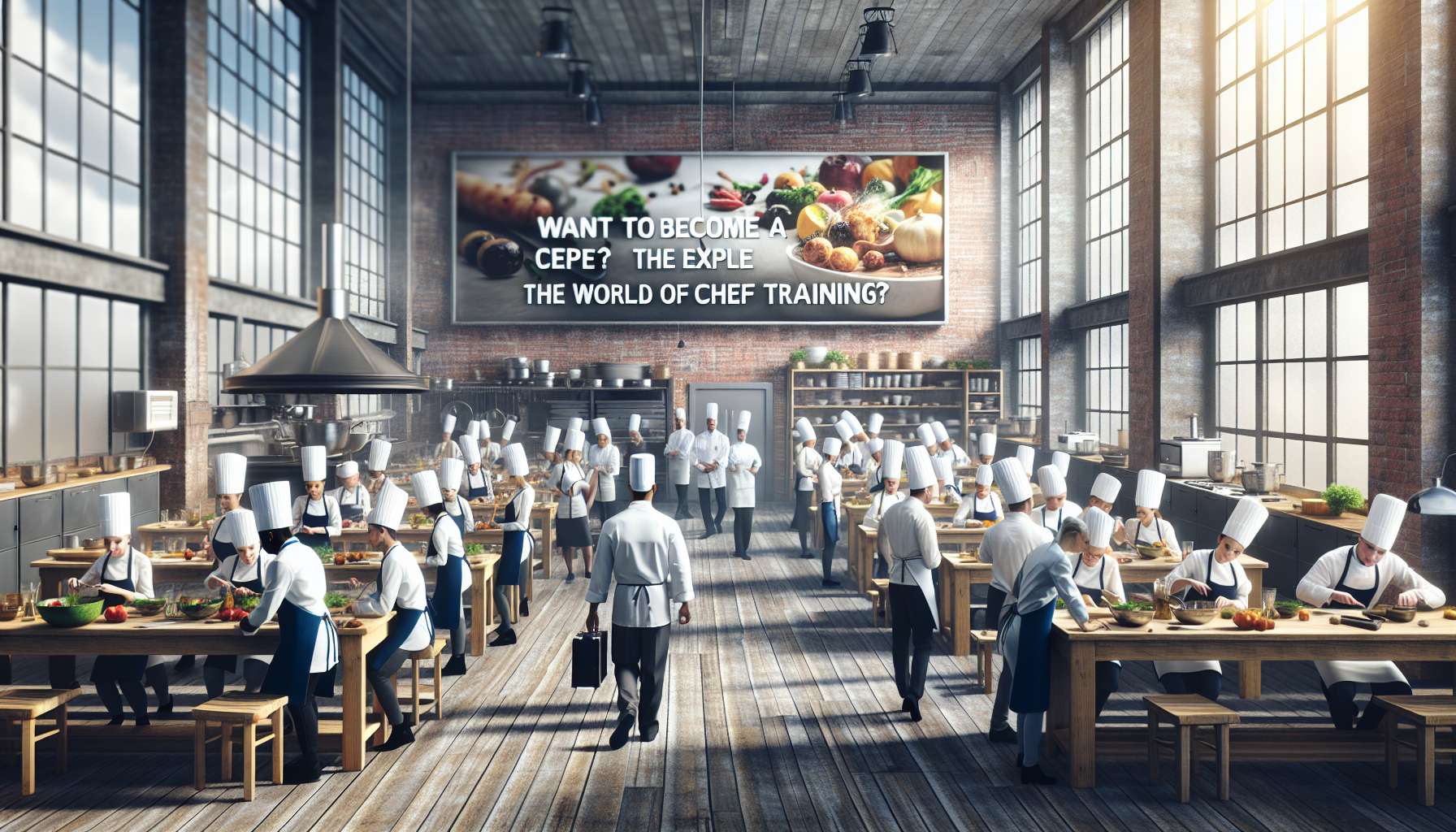Why you should aspire to be a top chef
Why you should aspire to be a top chef
Being a chef is not just about cooking food. It is about creating culinary masterpieces, pushing the boundaries of taste and presentation, and serving unforgettable experiences on a plate. If you have a passion for food and a desire to excel in the culinary world, aspiring to be a top chef can open up a world of opportunities and rewards.
The thrill of creativity
As a top chef, you become an artist. Each dish becomes your canvas, and your ingredients are your paintbrushes. You have the opportunity to experiment with flavors, textures, and techniques to create something truly unique and remarkable. The thrill of channeling your creativity into every plate is a driving force that keeps aspiring chefs passionate about their craft.
The pursuit of perfection
Top chefs strive for perfection in every aspect of their work. From selecting the finest ingredients to mastering culinary techniques, they leave no stone unturned. The dedication and attention to detail required to be a top chef is what sets them apart from the rest. The pursuit of perfection becomes a lifelong journey, constantly pushing you to improve and evolve as a chef.
The art of storytelling
Cooking is more than just preparing food. It is a way of connecting with people, invoking emotions, and telling stories. As a top chef, you have the power to create memories and leave a lasting impression on your diners. Each dish becomes a chapter in your culinary narrative, showcasing your style and personality.
A world of culinary exploration
Becoming a top chef opens doors to endless opportunities for culinary exploration. From working in prestigious restaurants to traveling the world and experiencing different cuisines, the culinary world becomes your playground. You have the chance to learn from renowned chefs, immerse yourself in diverse culinary traditions, and constantly expand your knowledge and skills.
Recognition and fulfillment
Achieving a top chef status brings recognition, accolades, and a sense of fulfillment. The hard work and dedication you put into your craft are acknowledged and appreciated by both your peers and diners. Your culinary creations become a source of pride, and the satisfaction of knowing that you have made a significant impact in the culinary world is truly gratifying.
In conclusion, aspiring to be a top chef is not just about cooking food; it is a way of life. It demands creativity, perfection, storytelling, exploration, and a relentless pursuit of excellence. So if you have a passion for food and a burning desire to make your mark in the culinary world, don your chef’s hat, sharpen your knives, and start your journey to becoming a top chef.
The importance of chef training

Becoming a successful chef requires more than just a passion for cooking. It also requires proper training and education. Chef training programs provide aspiring chefs with the knowledge and skills they need to excel in the culinary industry. In this article, we will explore the importance of chef training and how it can set you on the path to culinary success.
1. Enhancing Culinary Skills
Chef training programs are designed to help individuals enhance their culinary skills. From basic knife skills to advanced techniques, these programs cover a wide range of cooking techniques and methods. By participating in hands-on training sessions and learning from experienced chefs, aspiring chefs can develop the necessary skills to create extraordinary culinary delights.
2. Experiencing Different Cuisines
Chef training programs often expose students to a variety of cuisines from around the world. This allows aspiring chefs to expand their culinary knowledge and gain a deeper appreciation for different flavors, ingredients, and cooking traditions. By learning about different cuisines, chefs can incorporate diverse elements into their own creations, giving them a competitive edge in the culinary industry.
3. Mastering Kitchen Management
Being a chef is not just about cooking great food; it also involves effective kitchen management. Chef training programs teach aspiring chefs how to manage a kitchen efficiently, including inventory control, menu planning, and staff scheduling. These skills are essential for running a successful restaurant or culinary business.
4. Networking Opportunities
Chef training programs often offer networking opportunities with industry professionals, including renowned chefs, restaurant owners, and industry experts. These connections can open doors to job opportunities, apprenticeships, and mentorships, providing aspiring chefs with valuable guidance and support as they advance in their culinary careers.
5. Building Professional Reputation
Completing a chef training program demonstrates a commitment to professional growth and sets aspiring chefs apart from their peers. Employers value the dedication and drive that comes with formal training, and it can significantly enhance an individual’s job prospects. Additionally, having formal training can give aspiring chefs the confidence to showcase their skills and work towards establishing a strong professional reputation in the culinary industry.
Chef training plays a vital role in shaping a successful culinary career. It provides aspiring chefs with the necessary skills, knowledge, and experiences to excel in the industry. By enhancing culinary skills, exposing students to different cuisines, teaching kitchen management, facilitating networking opportunities, and helping build a professional reputation, chef training programs set individuals on the path to becoming skilled chefs. So, if you aspire to be a chef, investing in a chef training program is a step in the right direction towards achieving your culinary dreams.
Exploring the different aspects of chef training

If you have a passion for cooking and aspire to become a professional chef, proper training is key to honing your skills and acquiring the necessary knowledge to excel in the culinary world. Chef training is a multi-faceted journey that encompasses various aspects, from culinary techniques and creativity to management skills and industry knowledge. In this article, we’ll take a closer look at the different aspects of chef training, providing you with a comprehensive guide to kickstart your culinary career.
Culinary Techniques and Skills
The foundation of chef training lies in mastering culinary techniques and developing essential skills. From knife skills to various cooking methods, such as sautéing, grilling, and baking, a chef should be well-versed in the fundamentals of preparing and cooking food. A good chef training program will provide hands-on experience in a professional kitchen, allowing aspiring chefs to practice and refine their techniques under the guidance of experienced instructors.
In addition to technical skills, creativity is a vital component of a chef’s repertoire. Chefs are artists in their own right, using ingredients as their medium and plates as their canvas. Culinary training should encourage aspiring chefs to experiment with flavors, textures, and presentations, empowering them to create dishes that are both visually stunning and gastronomically pleasing.
Menu Planning and Recipe Development
Another crucial aspect of chef training is learning how to plan menus and develop recipes. A well-thought-out menu should showcase a chef’s culinary style while considering factors such as seasonal ingredients, dietary restrictions, and customer preferences. The ability to create balanced and innovative menus is essential for a successful chef.
Recipe development involves the process of conceptualizing, testing, and refining recipes. Aspiring chefs should understand the principles of recipe development, including ingredient substitutions, portion sizing, and flavor pairing. A comprehensive chef training program will provide a platform for chefs-in-training to experiment with recipes, allowing them to develop their signature dishes and refine their culinary skills.
Management and Leadership Skills
A chef’s role extends beyond the kitchen, as they are often responsible for managing a team of kitchen staff, ensuring smooth operations, and delivering exceptional dining experiences. Therefore, an effective chef training program should incorporate essential management and leadership skills.
Training in this area should cover topics such as inventory management, cost control, staff scheduling, and effective communication. Developing strong leadership skills will enable aspiring chefs to lead their teams with confidence, create a positive work environment, and maintain high standards of quality and efficiency in the kitchen.
Industry Knowledge and Professional Development
Beyond culinary techniques and management skills, a successful chef should also be well-versed in the industry’s trends, innovations, and best practices. Keeping up with industry knowledge is vital for staying relevant and continuously improving as a chef.
A chef training program that emphasizes industry knowledge should cover topics such as food safety and sanitation, sustainability practices, and emerging culinary trends. Exposure to industry experts, guest chefs, and culinary events can provide valuable networking opportunities and insights into the latest developments in the culinary world.
Chef training encompasses a wide range of aspects, from mastering culinary techniques and developing creativity to managing teams and staying updated with industry knowledge. By immersing yourself in a comprehensive chef training program, you will acquire the necessary skills and knowledge to embark on a successful and fulfilling culinary career. So, let your passion for cooking fuel your journey, and explore the diverse facets of chef training as you embark on this exciting path!
Resources for pursuing a career in the culinary arts

1. Culinary Schools
If you dream of becoming a professional chef, attending a reputable culinary school is a great way to kickstart your career. Here are some of the top culinary schools around the world:
- Le Cordon Bleu: Known for its prestigious culinary programs, Le Cordon Bleu has campuses in various countries, offering both diploma and degree programs.
- The Culinary Institute of America (CIA): Considered the gold standard in culinary education, CIA offers comprehensive programs that encompass everything from basic techniques to advanced culinary arts.
- Institute of Culinary Education (ICE): Located in New York City, ICE boasts a wide range of culinary courses and professional development programs to suit different interests and skill levels.
- Johnson & Wales University: With campuses in multiple cities, Johnson & Wales University offers culinary arts programs that emphasize hands-on training and offer real-world experiences.
2. Online Learning Platforms
If attending a physical culinary school is not feasible for you, consider taking advantage of online learning platforms that offer culinary courses. Some popular platforms include:
- ChefSteps: Known for its innovative approach to culinary education, ChefSteps provides online classes taught by experienced chefs, covering a wide range of topics.
- Rouxbe: Rouxbe is an online culinary school that offers professional certification programs in areas such as plant-based cooking, culinary arts, and culinary nutrition.
- Craftsy: Craftsy offers a variety of cooking and baking courses taught by industry professionals, allowing you to learn at your own pace from the comfort of your own kitchen.
3. Cookbooks and Recipe Websites
Building a strong foundation in culinary arts involves studying recipes and learning from experienced chefs. Here are some renowned cookbooks and recipe websites that can enhance your culinary skills:
- Mastering the Art of French Cooking by Julia Child: A classic cookbook that has inspired countless chefs, this book covers essential French cooking techniques and recipes.
- The Professional Chef by The Culinary Institute of America: A comprehensive guide to the culinary arts, this book is widely used in culinary schools and covers everything from knife skills to menu planning.
- Food Network: The Food Network website offers a plethora of recipes from celebrity chefs, cooking tips, and instructional videos to help you refine your culinary techniques.
4. Internships and Apprenticeships
Hands-on experience is crucial in the culinary world. Consider seeking out internships or apprenticeships at renowned restaurants or hotels to gain real-world skills and build your network of industry professionals.
5. Culinary Competitions and Events
Participating in culinary competitions and attending industry events can be a great way to showcase your talents, learn from industry leaders, and make valuable connections. Keep an eye out for regional and international cooking competitions or food festivals in your area.
No matter which path you choose, pursuing a career in the culinary arts requires dedication, passion, and continuous learning. Utilize these resources to develop your skills, expand your knowledge, and embark on a successful culinary journey.
